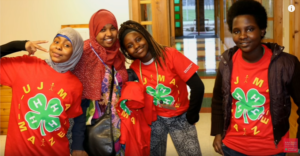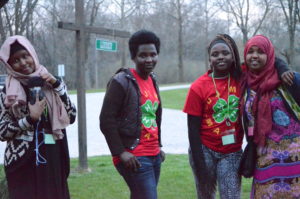The Association of Public and Land-grant Universities (APLU) announced Iowa State University as the “Talent” award winner during its sixth annual Innovation & Economic Prosperity (IEP) University Awards held on November 12, 2017 at the association’s annual meeting in Washington, DC. The Office of Economic Development and Industry Relations wanted to take this opportunity to highlight the three case study narratives Iowa State University submitted toward its award-winning application. The third in the series of three is a spotlight on the Inclusivity case study narrative.
Case Study #3 – Inclusivity Case Study: 4-H Youth Development Creating a Sense of Place
“Welcoming and inclusive needs to be as much part of the Iowa 4-H brand as rural is now. Because what keeps diverse kids interested in 4-H is also what keeps all kids interested in 4-H, belonging.”
- 2014 job interview response to the question, “What would you do to grow 4-H in Iowa?” by John-Paul Chaisson-Cardenas, now Iowa 4-H State Leader (See Link #1 and Link #2)
Beginning in 2014, the Iowa State University Extension and Outreach 4-H Youth Development program began to move from the concept of youth inclusion to belonging. Iowa 4-H made this change in response to two significant factors: 1. Iowa has seen significant growth in its population of youth of color. These youth are surpassing white, non-Hispanic youth by birth rate and by immigration. 2. The number of youth in 4-H clubs and learning communities had decreased each year from 2004 to 2014 (Iowa 4-H Data for Decision Makers).
One in 5 school age (K-12) youth in Iowa is of color. Iowa has seen a 110% growth in Latino population from 2000-2014; 88.5 for Asian; and 71.5 African-American (Iowa Department of Education). However, Iowa 4-H membership did not mirror this growth. While the foundational elements of 4-H (experiential learning, positive youth development, etc.) are well-suited for cross-cultural and multicultural contexts, some of the language and traditions of 4-H may not be as culturally relevant to diverse youth populations.
Belonging is defined as the need youth have to know they are cared about by others and feel a sense of connection to others in group settings. To quote Dr. Erguner-Tekinalp, Ph.D. “Belonging is more than tolerance, acceptance, or inclusion. Belonging means we feel connected, important, valued, part of the group. It is our group, our program, our community.” Iowa 4-H strives to give youth the opportunity to feel physically and emotionally safe while actively engaging in its program.
This effort did not come without pushback, including fears that bringing in “those youth” would water down the leadership focus of the program, and that Iowa 4-H was moving away from its “traditional” roots.
4-H staff and volunteers also lacked cultural competence skills. These concerns were addressed by a systemic training emphasis in cultural competence and inclusion.
A second set of challenges facing Iowa 4-H was to bring this effort to scale and create rapid programmatic change. Iowa 4-H developed targeted programs that would reflect the positive cultural knowledge youth and their families have, but that usually is unrecognized. In 2015, Iowa 4-H created the first of three Culturally-based Youth Leadership Accelerators (CYLA) – Maize (Latino/Native American youth). In 2016, UJIMA (African American and African immigrant youth) was introduced and in 2017 Iowa 4-H will offer a new CYLA for Asian American and Pacific Islander youth.
Each CYLA is designed to mobilize cultural strengths and culturally-based narratives to introduce and strengthen the relationship between youth and 4-H; introduce and train staff, volunteers, and faculty to culturally-relevant leadership models; and connect underrepresented youth whose families may have no experience with post-secondary education and the college experience.
Each CYLA also includes the same essential elements: the development of a local cohort; the use of an ethnic/cultural studies approach, a day on the Iowa State University campus visiting colleges chosen by each youth; hands-on activities led by faculty and cultural experts; an overnight retreat; and a day of culturally-based workshops that embed the program priorities of 4-H — Healthy Living, STEM, Citizenship, and Leadership, and Communication and the Arts.
Examples of how this approach works can be seen in videos about Maize (See Video #1), Ujima (See Video #2), and CYLA (See Video #3), which were filmed and produced by youth CYLA participants and State 4-H Youth Council members.
Realizing the youths’ experience cannot end when the CYLA retreat does, Iowa 4-H invests in CYLA mini-grants, available to each county that brings youth to the CYLA. It is critical that the youth served by the CYLAs not only see themselves as contributing members of 4-H, but also become contributing members of their communities across the state. The state’s future business and industry leaders as well as the education and government leaders will look different that they do currently. And with programs such as the CYLAs, it is hoped that these future leaders will be better prepared to lead all Iowans into an uncertain future.
Results
- In the first two years, the CYLAs have brought more than 500 young leaders of color into 4-H programs in 11 counties. In some cases, the youth have joined existing 4-H clubs and learning communities, but many more have worked with volunteers to develop more than 15 nascent, culturally-based clubs. In these 11 counties, the percent of youth of color in clubs went from 4.9 percent in the 2013-14 program year to 10.9 percent in the 2016-2017 program year.
- Many of the CYLA participants will likely be the first in their families to attend college, and many more had never visited a major university until their CYLA experience. The opportunity to visit colleges and see what courses of study are available to them are often highlighted by the youth in the program evaluation.
- These CYLA graduates have also been tapped to help lead statewide programming, including the Iowa 4-H Youth Conference, Iowa State Fair, Global Citizenship Day, National 4-H Congress, and the National 4-H Conference.
- Because of this rapid success and innovative approach, Iowa is now influencing 4-H Programs at a national level. The Iowa 4-H staff has provided training and technical assistance to other Extension systems (Illinois, Indiana, and Minnesota), and has presented at several conferences, including the National Extension Conference on Volunteerism, National Association of Extension 4-H Agents, Epsilon Sigma Phi, and the National 4-H State Leaders meeting. In October 2017, the Iowa 4-H Leader will keynote an e-academy webinar series on diversity and inclusion.
Read Case Study #1 – CyBIZ Lab: Creating a Website to Improve Intermodal Freight Transportation in Iowa here
Read Case Study #2 – Fostering Connections: Accessing Tomorrow’s Talented Workforce here



Recent Comments